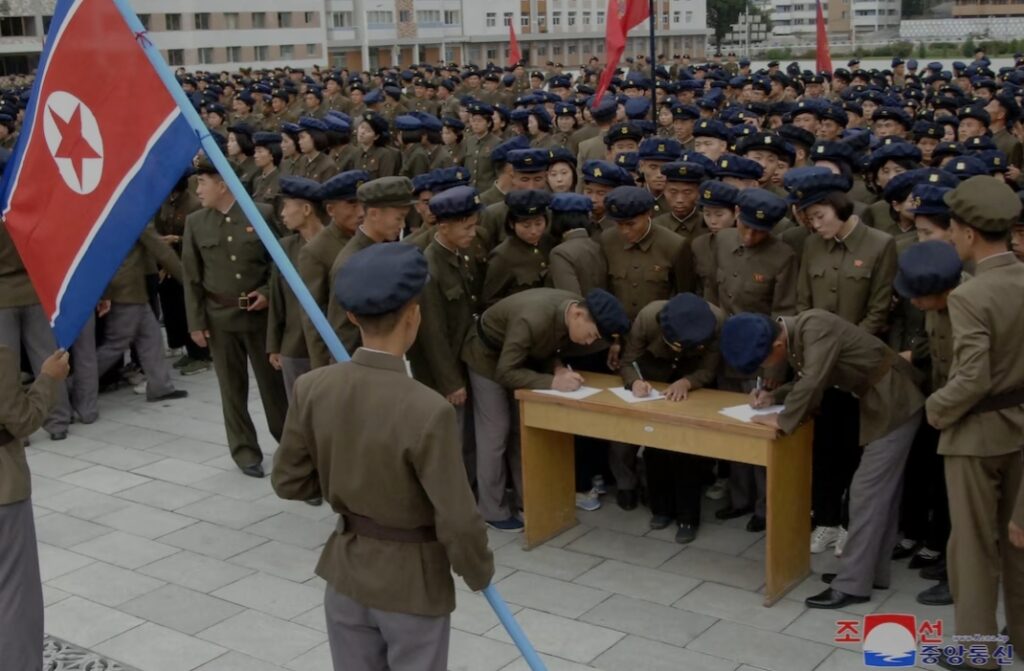Reuters

North Korean state media said on Wednesday around 1.4 million young people had applied to join or return to the army this week, blaming Seoul for a provocative drone incursion that had brought the “tense situation to the brink of war”.
The fiery rhetoric comes after North Korea last week accused Seoul of sending drones over Pyongyang that scattered a “huge number” of anti-North leaflets. The North then blew up inter-Korean roads and rail lines on its side of the border on Tuesday, and warned that the South would “pay a dear price”.
The young people, including students and youth league officials who had signed petitions to join the army, were determined to fight in a “sacred war of destroying the enemy with the arms of the revolution,” the official KCNA news agency said.
“If a war breaks out, the ROK will be wiped off the map. As it wants a war, we are willing to put an end to its existence,” the KCNA report said, using the initials of the South’s official name, the Republic of Korea.
North Korea has previously made similar claims about young people scrambling to enlist at a time of heightened tensions, though such statements from the isolated state are difficult to verify.
Last year, state media reported on 800,000 of its citizens volunteering to join the North’s military to fight against the United States. It also said in 2017 that nearly 3.5 million workers, party members and soldiers volunteered to serve.
According to data from the International Institute for Strategic Studies (IISS), North Korea has 1.28 million active soldiers and about 600,000 reservists, with 5.7 million Worker/Peasant Red Guard reservists among many unarmed units.
Seoul’s defence ministry did not comment on the latest KCNA report, but has warned that if North Korea inflicts harm on the safety of South Koreans, that day will be “the end of its regime.”
Later on Wednesday, vice foreign ministers of South Korea, the United States and Japan held a news conference after talks in Seoul and strongly condemned the North for “intentionally raising tension” by claiming the drone intrusion and sealing the southern border.
Western countries have long accused North Korea of sending weapons to help Russia fight in Ukraine. On Wednesday, Ukrainian President Volodymyr Zelenskiy said the North was also sending personnel, becoming effectively a participant in the war.
Asked about that issue, U.S. Deputy Secretary of State Kurt Campbell said there were signs of the North’s enhanced material support for Russia “which is being felt on the battlefield”, but that Washington was still evaluating the reports.
The three officials earlier in the day announced a new, 11-nation team to monitor the enforcement of sanctions against the North after Russia and China thwarted a U.N. mechanism.
FLARE-UP IN TENSION
An official at Seoul’s unification ministry handling inter-Korean affairs said Pyongyang might be seeking to consolidate people’s unity and build logic for a provocation by kindling and exaggerating tension against the South.
There also seemed to be public pressure on North Korean leader Kim Jong Un over economic challenges, the official said.
Park Won-gon, a professor at the Ewha Womans University in Seoul, said North Korea appeared to be using the drone incident to rally people against the South in line with its push to sever cross-border ties and promote a “two-state” system.
“If you look at the interviews that keep appearing in state media, there are very harsh words toward the South, and that’s their typical public mobilisation propaganda,” he said.
Early this year, Kim declared South Korea a “primary foe” and said unification was no longer possible, and the North has since been taking steps to cut inter-Korean relations.
The two Koreas are still technically at war after their 1950-53 war ended in an armistice, not a peace treaty.
